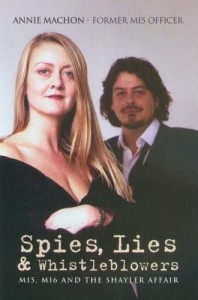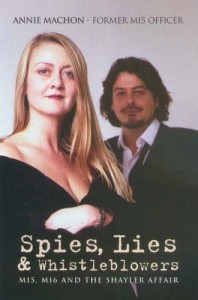A review on “Cinepolitics” of the new film of John Le Carre’s classic spy novel, and its continuing relevance:
A review on “Cinepolitics” of the new film of John Le Carre’s classic spy novel, and its continuing relevance:
Nothing like being paid to read a book — a win-win situation for me.
Here’s a link to my review in the Sunday Express newspaper of a new history of MI6, called “The Art of Betrayal” by Gordon Corera, the BBC’s Security Correspondent.
And here’s the article:
REVIEW: THE ART OF BETRAYAL — LIFE AND DEATH IN THE BRITISH SECRET SERVICE
Friday August 19, 2011
By Annie Machon
THE Art of Betrayal: Life and Death in the British Secret Service
Gordon Corera Weidenfeld & Nicholson, £20
THE INTRODUCTION to The Art Of Betrayal, Gordon Corera’s unofficial post-war history of MI6, raises questions about the modern relevance and ethical framework of our spies. It also provides an antidote to recent official books celebrating the centenaries of MI5 and MI6.
Corera, the BBC’s security correspondent, has enjoyed privileged access to key spy players from the past few decades and, writing in an engaging, easy style, he picks up the story of MI6 at the point where the “official” history grinds to a halt after the Second World War.
Spy geeks will enjoy the swashbuckling stories from the Cold War years and he offers an intelligent exploration of the mentality of betrayal between the West and the former Soviet Union, focusing on the notorious Philby, Penkovsky and Gordievsky cases among many others.
For the more cynical reader, this book presents some problems. Where Corera discusses the aimless years of MI6 post-Cold War attempts at reinvention, followed by the muscular, morally ambiguous post‑9/11 world, he references quotes from former top spies and official inquiries only, all of which need to be read with a healthy degree of skepticism. To use a memorable quote from the Sixties Profumo Scandal, also mentioned in the book: “Well, they would say that, wouldn’t they?”
In Corera’s view, there has always been inherent tension in MI6 between the “doers” (who believe that intelligence is there to be acted upon James Bond-style and who want to get their hands dirty with covert operations) and the “thinkers” (those who believe, à la George Smiley, that knowledge is power and should be used behind the scenes to inform official government policy).
He demonstrates that the “doers” have often been in control and the image of MI6 staffed by gung-ho, James Bond wannabes is certainly a stereotype I recognise from my years working as an intelligence officer for the sister spy organisation, MI5.
The problem, as this book reveals, is that when the action men have the cultural ascendancy within MI6 events often go badly wrong through establishment complacency, betrayal or mere enthusiastic amateurism.
That said, the opposing culture of the “thinkers”, or patient intelligence gatherers, led in the Sixties and Seventies to introspection, mole-hunting paranoia and sclerosis.
Worryingly, many former officers down the years are quoted as saying that they hoped there was a “real” spy organisation behind the apparently amateur outfit they had joined, a sentiment shared by most of my intake in the Nineties.
Nor does it appear that lessons were learned from history: the Operation Gladio débâcle in Albania and the toppling of Iran’s first democratically-elected President Mossadeq in the Fifties could have provided valuable lessons for MI6 in its work in Afghanistan, Iraq, and Libya over the past two decades.
Corera is remarkably coy about Libya despite the wealth of now publicly-available information about MI6’s meddling in the Lockerbie case, the illegal assassination plot against Gaddafiin 1996 and the dirty, MI6-brokered oil deals of the past decade.
Corera pulls together his recurring themes in the final chapters, exploring the compromise of intelligence in justifying the Iraq war, describing how the “doers” pumped unverified intelligence from unproven agents directly into the veins of Whitehall and Washington.
Many civil servants and middle-ranking spies questioned and doubted but were told to shut up and follow orders. The results are all-too tragically well known.
Corera does not, however, go far enough.
He appreciates that the global reach of MI6 maintains Britain’s place in an exclusive club of world powers. At what price, though?
Here is the question he should perhaps have asked: in light of all the mistakes, betrayals, liberties compromised, lessons unlearned and deaths, has MI6 outlived its usefulness?
Annie Machon is a former MI5 intelligence officer and author.
Verdict 4/5

 Over the last few years there have been a number of egregious cases of police and state cover-ups in the UK around the deaths and wrongful prosecutions of innocent people.
Over the last few years there have been a number of egregious cases of police and state cover-ups in the UK around the deaths and wrongful prosecutions of innocent people.
This brings to my mind the appalling miscarriage of justice that occurred in the 1990s when two Palestinian students, a young woman called Samar Alami and a young man called Jawad Botmeh, were both wrongfully convicted of conspiracy to bomb the Israeli embassy in London in July 1994.
In this case a highly sophisticated car bomb as detonated outside the embassy. Thankfully nobody was killed, but a number of people suffered minor injuries. Alami and Botmeh had connections to Palestinian political support groups based in London at the time, many of whom were rounded up during the investigation. Botmeh had naively helped out a shadowy and never-identified figure called Reda Moghrabi, who asked for assistance in buying a second-hand car at auction. This was the car that was used in the explosion.
Why is this case an example of establishment cover-up? Well, this was one of the cases that former MI5 officer David Shayler blew the whistle on during the 1990s. He revealed the existence of two relevant documents that should have been disclosed to the defence but, for some unaccountable reason, were not.
The first, an agent report from a credible and trusted source, pointed to a non-Palestinian group planning the attack before it had even occurred. This report was not acted upon by the MI5 officer responsible, who then tried to cover up her mistake. She was caught out, and there was a much-discussed internal inquiry into the matter within MI5’s G Branch (international terrorism) in late 1994.
But there was another document — one written by G9/1, the senior MI5 officer who oversaw the post-incident investigation. His view was that Mossad, the external Israeli intelligence agency, had carried out a controlled explosion outside its own embassy (the shadowy and unidentified Reda Moghrabi being the potentially crucial missing link) in order to acquire the long-demanded additional security protection around Israeli interests in the UK, and also to shatter the Palestinian support networks in London — a long-term objective of Mossad.
The government at the time tried to dismiss these disclosures. However, the much-missed Private Eye investigative journalist, Paul Foot, and the indefatigable lawyer, Gareth Peirce, followed them up and pursued them tirelessly through the media and the courts.
And guess what? It turns out that these two key documents had indeed not been disclosed to the legal defence team during the trial of Alami and Botmeh — and not just by the hapless spooks. It emerged during the appeal hearing that no fewer than seven people from a variety of police and intelligence organisations had failed to disclose the relevant documentation to the defence. This cannot be explained away as an innocent oversight, a cock-up — it bears all the hallmarks of a deliberate, systemic establishment cover-up.
All this represented, at the very least, a need for a retrial but also a possible gross miscarriage of justice. And yet, while acknowledging that these documents did indeed exist during the appeal hearing and beyond, the presiding m’luds decided to ignore all case law and European law and let those two innocents rot in prison. After all, it would be terribly embarrassing to vindicate the actions of an intelligence whistleblower, wouldn’t it?
As a result, the poor pawns in this sick establishment game, Jawad Botmeh and Samar Alami, ended up serving their full sentences, despite the overwhelming body of evidence proving their innocence, and were finally released in 2008 and 2009 respectively.
For anyone interested in the detailed horror story behind this flagrant miscarriage of justice, here is the relevant chapter from my long-defunct book: Download The_Israeli_Embassy_Case
I’ve been following with interest the retro, Cold War spy saga currently unfolding in the USA. The headlines being that 10 alleged Russian sleepers (“illegals” in spy lingo) have been arrested by the FBI and are now charged with “working as agents of a foreign power”, which carries a sentence of five years in prison.
These Russian “illegals”, some of whom reportedly have been living openly as Russian immigrants, some as other foreign nationals, have allegedly been infiltrating the US since the mid-1990s, and were tasked to get friendly with American power-brokers, to glean what information they could about the thoughts of the US great and the good about Russia, Iran, defence plans etc.
Whatever the truth of this case, and the charges are detailed, I find the timing and media attention given to this story interesting for three key reasons:
From what has been reported of the court papers, the FBI investigation has been going on for years. Apparently they have known about the spy ring since 2000, and have included communications intercept material in the indictment dating from 2004 and 2008, as well as sting operations from the beginning of this year. So it’s curious that the FBI decided to swoop now, in the immediate aftermath of a successful and, by all accounts friendly, meeting between the Russian and American presidents in Washington DC.
Many people are commenting on this aspect of the timing. And, indeed, one might speculate about wheels within wheels — it appears that there are still hardline factions within the US administration that want to ensure that a warmer working relationship cannot develop between Russia and the USA. A strategy of tension is good for business – especially companies like Halliburton and Xe (formerly Blackwater) which profit from building vast US military bases in Central Asia.
But what also intrigues me is the possible behind-the-scenes action.
 This story is getting blanket media coverage. It’s a good, old-fashioned, Cold War-style coup, hitting all the jingoistic spy buttons, just at a time when the US spooks are under pressure about their performance in the nebulous and ever-shifting “war on terror”, the shredding of constitutional rights, the illegal surveillance of domestic political activists, and complicity in extraordinary rendition and torture. It’s a useful “reminder” that the bloated US security infrastructure is worth all the money it costs, despite the dire state of US national finances. Pure propaganda.
This story is getting blanket media coverage. It’s a good, old-fashioned, Cold War-style coup, hitting all the jingoistic spy buttons, just at a time when the US spooks are under pressure about their performance in the nebulous and ever-shifting “war on terror”, the shredding of constitutional rights, the illegal surveillance of domestic political activists, and complicity in extraordinary rendition and torture. It’s a useful “reminder” that the bloated US security infrastructure is worth all the money it costs, despite the dire state of US national finances. Pure propaganda.
I’m also willing to bet that there is a more covert aspect to this story too — some behind-the-scenes power play. There are, at the last count, 17 acknowledged intelligence agencies in the US, all competing for prestige, power and resources. By making these arrests, the FBI will see this as a step up in the spy pecking order. It reminds me inevitably (and perhaps flippantly) of the classic spy novel by former intelligence officer Graham Greene, “Our Man in Havana”. In this no doubt entirely fictional work, a British MI6 asset invents a spy ring to increase his standing and funding from London HQ.
Also curious is the role played by one Christopher Metsos, allegedly the 11th man, not initially arrested, who is reported to have passed money to the spy ring. He was caught yesterday in Cyprus trying to board a plane to Hungary, and inexplicably granted bail — inexplicable at least to the Greek police, who always worry that their suspect will flee over the border into the Turkish segment of the island, never to be seen again. And this has indeed happened, according to The Guardian newspaper this evening. Perhaps he has some urgent appointments to sell vacuum cleaners north of the border.….
 Sir Richard Dearlove, ex-head of MI6 and current Master of Pembroke College, Cambridge, has been much in the news recently after gracing the Hay on Wye book festival, where he gave a speech. In this, he is reported to have spoken out, in strong terms, against the endemic and all-pervasive surveillance society developing in the UK.
Sir Richard Dearlove, ex-head of MI6 and current Master of Pembroke College, Cambridge, has been much in the news recently after gracing the Hay on Wye book festival, where he gave a speech. In this, he is reported to have spoken out, in strong terms, against the endemic and all-pervasive surveillance society developing in the UK.
Ex-spy chiefs in the UK have a charming habit of using all these surveillance measures to the nth degree while in the shadows, and then having a Damascene conversion into civil liberties campaigners once they retire. Eliza Manningham-Buller, the ex-head of MI5, used her maiden speech in the House of Lords to argue against the extension of the time limit the police could hold a terrorist suspect without charge, and even Stella Rimington (also ex-MI5) has recently thrown her hat in the ring. They nick all my best lines these days.
Wouldn’t it be great if one of them, one day, could argue in favour of human rights, proportionality and the adherence to the law while they were still in a position to influence affairs?
Dearlove himself could have changed the course of world history if he had found the courage to speak out earlier about the fact that the intelligence case for the Iraq war was being fixed around pre-determined policy. As it is, we only know that he objected to this because of the notorious, leaked Downing Street Memo.
The Guardian newspaper reported that Dearlove even touched on the reality of obtaining ministerial permission before breaking the law. Which, of course, is the ultimate point of the 1994 Intelligence Services Act, and does indeed enshrine the fabled “licence to kill”. It states that MI6 officers can break the law abroad with impunity from prosecution if, and only if, they obtain prior written permission from their political master — in this case the Foreign Secretary.
However, according to The Guardian, he seems to have misunderstood the spirit of the law, if not the letter:
He said that the intelligence community was “sometimes asked to act in difficult circumstances. When it does, it asks for legal opinion and ministerial approval … It’s about political cover”.
Momentarily putting aside the not unimportant debate about whether the spies and the government should even be allowed technically to side-step international laws against crimes up to, and including, murder, I am still naively surprised by the shamelessness of this statement: the notion of ministerial oversight was put in place to ensure some kind of democratic oversight and accountability for the work of the spies — not to provide political cover, a fig leaf.
I think he’s rather given the game away here about how the spies really view the role of their “political masters”.
 Journalist and writer James Bamford, has a new book, “The Shadow Factory: The Ultra-Secret NSA from 9/11 to the Eavesdropping on America” (Doubleday), which came out this week in the United States.
Journalist and writer James Bamford, has a new book, “The Shadow Factory: The Ultra-Secret NSA from 9/11 to the Eavesdropping on America” (Doubleday), which came out this week in the United States.
Bamford is a former producer at ABC News of thirty years’ standing, and his book has caused quite a stir. One of his key gripes is the fact that foreign companies try to acquire work in sensitive US departments. He cites in particular the attempt in 2006 of Israeli data security company, Check Point Software Technologies, to buy an American company with existing contracts at the Defence Department and the NSA. This deal was stopped after the FBI objected.
Foreign software and security companies working within intelligence agencies are indeed a problem for any country. It compromises the very notion of national sovereignty. In the UK, MI5 and many other government departments rely on proprietary software from companies like Microsoft, notorious for their vulnerability to hackers, viruses and back door access. Should our nation’s secrets really be exposed to such easily avoidable vulnerabilities?
Another section of the book to have hit the headlines is Bamford’s claims that bedroom “conversations” of soldiers, journalists and officials in Iraq have been bugged by the National Security Agency (NSA).
Bamford, who is by no means a fan of the NSA in its current rampant form, makes the mistake of thinking that in the innocent days pre‑9/11, the agency respected democratic rights enshrined in the US constitution and never snooped on US citizens in their own country.
While technically this might be true, does nobody remember the ECHELON system?
 ECHELON was an agreement between the NSA and its British equivalent GCHQ (as well as the agencies of Canada, Australia, and New Zealand) whereby they shared information they gathered on each others’ citizens. GCHQ could legally eavesdrop on people outside the UK without a warrant, so they could target US citizens of interest, then pass the product over to the NSA. The NSA then did the same for GCHQ. Thus both agencies could evade any democratic oversight and accountability, and still get the intelligence they wanted.
ECHELON was an agreement between the NSA and its British equivalent GCHQ (as well as the agencies of Canada, Australia, and New Zealand) whereby they shared information they gathered on each others’ citizens. GCHQ could legally eavesdrop on people outside the UK without a warrant, so they could target US citizens of interest, then pass the product over to the NSA. The NSA then did the same for GCHQ. Thus both agencies could evade any democratic oversight and accountability, and still get the intelligence they wanted.
Special relationship, anyone?
 There is an ongoing campaign to save Bletchley Park for the nation, in the teeth of government opposition. As historic British monuments go, the question of whether to preserve it for posterity should be a no-brainer. Bletchley is not only where Hitler’s Enigma code machine was decrypted, along with many other systems, which arguably gave the Allies the intelligence advantage that led to victory in World War 2, it is also where the first digital electronic computers, codenamed Colossus, were operated. Two landmark events of the 20th century.
There is an ongoing campaign to save Bletchley Park for the nation, in the teeth of government opposition. As historic British monuments go, the question of whether to preserve it for posterity should be a no-brainer. Bletchley is not only where Hitler’s Enigma code machine was decrypted, along with many other systems, which arguably gave the Allies the intelligence advantage that led to victory in World War 2, it is also where the first digital electronic computers, codenamed Colossus, were operated. Two landmark events of the 20th century.
Recently The Times reported on this campaign. The article also the dwells at some length on how long Bletchley’s secrets were kept by the 10,000 people who worked there during the war. Although this information was declassified after 30 years, the habit of secrecy was so deeply ingrained that many former employees never breathed a word. The article laments the passing of this habit of discretion from British life, stating that politicians and senior intelligence officers now appear to view the possession of insider knowledge as a good pension fund when they come to write their memoirs.
 Over the last decade we have see a myriad of books emerging for the upper echelons of government and intelligence in the UK: Alastair Campbell, Robin Cook, Washington Ambassador Sir Christopher Meyer, ex-MI5 chief Dame Stella Rimington. Even Tony Blair has apparently signed a seven figure deal for his memoirs.
Over the last decade we have see a myriad of books emerging for the upper echelons of government and intelligence in the UK: Alastair Campbell, Robin Cook, Washington Ambassador Sir Christopher Meyer, ex-MI5 chief Dame Stella Rimington. Even Tony Blair has apparently signed a seven figure deal for his memoirs.
All these books have a number of characteristics in common: they are lengthy, but say little of relevance about the burning issues of the day; they appear to have been written for profit and not in the public interest; and not one of these writers has ever even been arrested under the Official Secrets Act, even when there is clear prima facie evidence of a breach.
Yet these diligent authors are the very people who are the first to use the OSA to stifle legitimate disclosure of crime, corruption and incompetence in the highest levels of government and intelligence by real whistleblowers, who risk their careers and their freedom. The hypocrisy is breathtaking.
But was the old-fashioned, blanket discretion, vaunted by The Times, really such a good thing? The code of “loose talk costs lives” may have made sense during the Second World War, when this nation was fighting for its life. The work at Bletchley was manifestly a success, obviating any need to blow the whistle. But who can tell how these patriotic men and women would have reacted had they witnessed crimes or incompetence that damaged our nation’s security, led to the deaths of our soldiers, or even possible defeat?
Also, was the 30-year non-disclosure rule around the work of Bletchley really necessary? After all, the war had been won, so how could disclosure benefit the enemy? This unthinking application of the standard rules cost the UK dearly. In fact, it would be accurate to say that it severely damaged the UK’s economic wellbeing – something the OSA is supposed to protect.
In 1943 the British were the world leaders in digital electronic computing. The draconian Official Secrets Act precluded the development and commercial use of this knowledge in Britain after the war. In fact, mindbogglingly, the Colossus computers were dismantled and the research destroyed.
![]() There were no similar provisions affecting the American cryptographers who had been stationed at Bletchley. Consequently, after the war they enthusiastically applied British research and technology to develop the US computer research programme and eventually the market, paving the way to the success of Silicon Valley and the domination of the world’s IT markets for decades. What price the famed British stiff upper lip and discretion then?
There were no similar provisions affecting the American cryptographers who had been stationed at Bletchley. Consequently, after the war they enthusiastically applied British research and technology to develop the US computer research programme and eventually the market, paving the way to the success of Silicon Valley and the domination of the world’s IT markets for decades. What price the famed British stiff upper lip and discretion then?
Of course, there need to be legal provisions to protect real secrets that could affect Britain’s national security. However, this should be proportionate and balanced, and should not prevent the development of new research and technologies, the exposure in the public interest of crime, and certainly not the fact our country was taken into war on the basis of lies.
Realistically, however, in the age of the internet such legal provisions are increasingly meaningless. Despite this, more and more countries appear to be adopting Britain’s model of antiquated and draconian secrecy legislation.
We live in a country that criminalises any disclosure of sensitive information – unless it comes in the form of memoirs from senior politicians, Whitehall officials or spooks of course. As always, there is one rule for the generals and one for the poor bloody infantry.
For the good of our country, we need to rethink this legislation.
Stephen Armstrong published an interesting article in today’s New Statesman magazine. Based on his new book War plc: the Rise of the New Corporate Mercenary, it examines the rise of the corporate security consultant. Or in basic English – mercenaries.
I met Stephen when I was invited by James Whale to review the book on Press TV. I was impressed with his research and depth of knowledge on this subject. It was an unusually harmonious talk show — rather than arguing, we all took a broadly similar approach to the issue of mercenaries, oversight and accountability.
The increasing privatisation of intelligence is an insidious development in the world of espionage and war. For many decades there have existed on the fringes of the official intelligence world a few private security companies; think Kroll, Blackwater, Aegis. These companies are often the last refuge of .….. former intelligence officers of the western spook organisations.
These people, often frustrated at the overly bureaucratic nature of the governmental spy organisations, resign and are gently steered towards these corporations. That, or the relocation officers get them nice juicy jobs at merchant banks, arms companies or international quangos. It’s always useful to have reliable chaps in useful places, after all.
 In the last decade, however, we have seen an explosion in the number of these companies. One of my former colleagues is a founder of Diligence, which is going from strength to strength. These kinds of companies specialise in corporate spying, the neutralisation of opposition and protest groups, and security. The latter usually boils down to providing military muscle in hot spots like Iraq. While I can see the attraction for soldiers leaving crack regiments and wondering what on earth they can do with their specialised expertise, and who then decide that earning £10,000 a week risking their lives in Baghdad is a good bet, this has worrying implications for the rule of law.
In the last decade, however, we have seen an explosion in the number of these companies. One of my former colleagues is a founder of Diligence, which is going from strength to strength. These kinds of companies specialise in corporate spying, the neutralisation of opposition and protest groups, and security. The latter usually boils down to providing military muscle in hot spots like Iraq. While I can see the attraction for soldiers leaving crack regiments and wondering what on earth they can do with their specialised expertise, and who then decide that earning £10,000 a week risking their lives in Baghdad is a good bet, this has worrying implications for the rule of law.
Leaving aside the small matter that, under international and domestic UK law, all wars of aggression are illegal, our official British military presence in Afghanistan and Iraq is at least to a certain degree accountable. The most egregious war crimes have resulted in court martials. But the new mercenaries live in a legal no-man’s land, and in this territory anything goes. Or can at least be covered up.
This is the same principle that has guided these unofficial spook companies over the years – plausible deniability. What little democratic oversight there is in the UK of the intelligence community still does give them limited pause for thought: what if the media hears about it? What if an MP asks an awkward question? By using former colleagues in the corporate intelligence world, MI5, MI6 et al can out source the risk.
The oversight and accountability for the official spooks and the army are bad enough. The privatisation of intelligence and military might makes a further mockery of the feeble oversight provisions in place in this country. This is a worrying development in legal and democratic terms; more importantly, it has a direct, daily impact on the rights of innocent men, women and children around the world. We need to ensure that the official and unofficial spooks and military are accountable under the law.
 My book about the Shayler affair (including the MI6 plot to assasinate Col. Gaddafi) and my experiences as an Intelligence Officer in MI5.
My book about the Shayler affair (including the MI6 plot to assasinate Col. Gaddafi) and my experiences as an Intelligence Officer in MI5.
I was invited on to “The Richard and Judy Show” in 2005 to talk about my book, and it is featured on the show’s website.
William Podmore was kind enough to review my work:
In this remarkable book, Annie Machon makes serious allegations against the British state’s intelligence services, MI5 and MI6. Ms Machon and her partner David Shayler are former high-ranking MI5 officers, both now retired from the service. The book’s allegations derive from their experiences and deserve at least to be the subject of inquiry.
She asserts that MI5 has illegally investigated thousands of British citizens for their political views; that there was collusion between the Army Forces Research Unit and loyalist terrorists; that MI5 failed to stop four major terrorist attacks in Britain, even though it had reliable evidence; and that MI5 and MI6 let a known Libyan terrorist into Britain and let him set up a terrorist network here.
She alleges that MI6’s counter-Iranian section used the Sunday Telegraph (and the journalists Con Coughlin, John Simpson and Dominic Lawson) to try to blame Iran for the 1988 Lockerbie bombing, the destruction of flight PA103. MI6 was trying to deflect attention from the fact that it was actually a Libyan retaliation for the US bombing of Tripoli (backed by Thatcher) in 1986.
The book’s most significant allegation is that MI6 illegally paid tens of thousands of pounds to Al-Qa’ida in 1995–96 to assassinate Colonel Gaddafi and seize power in Libya. In the attempted coup, several innocent civilians and security police were killed. If this is true, MI6, a British state agency, sponsored our terrorist enemies in a conspiracy to murder, which resulted in the killing of innocent civilians.
But Blair refuses to hear any evidence against the intelligence services, and prosecutes and harasses critics and whistleblowers. The Intelligence and Security Committee, set up under the 1994 Intelligence Services Act to oversee the services, is no use, because it is appointed by and reports only to the Prime Minister.
The intelligence services should work under the rule of law and respect democratic rights. Terrorist suspects should be arrested and brought to trial under criminal law, not detained, or executed, without trial, as has happened in Northern Ireland and elsewhere.
The intelligence services are supposed to protect us, but it would appear that they have instead connived in terrorism, putting us at greater risk of terrorist attack.
The Campaign for Press and Broadcasting Freedom (CPBF) also highlighted it.
The book can be ordered through Amazon.
Irish Sunday Tribune, July 2005
What really went on in the secret service?
Suzanne Breen
‘THEY’RE probably out there now, walking about, looking for targets, ” says former spy, Annie Machon, as she surveys the bustling bars, restaurants and shops in Gatwick Airport. MI5 used Heathrow and Gatwick in training courses. Officers would be sent to the airports and instructed to come back with one person’s name, address, date of birth, occupation and passport or driving licence number … the basic information for MI5 to open a personal file.
“They’d have to go up to a complete stranger and start chatting to them. One male officer nearly got arrested. It was much easier for women officers … nobody’s suspicious of a woman asking questions.”
Tall, blonde and strikingly elegant, Machon (37) could have stepped out of a TV spy drama. She arrives in a simple black dress, with pearl earrings, and perfect oyster nails. She is charmingly polite but, no matter how many questions you ask, she retains the slightly detached, inscrutable air that probably made her good at her job.
A Cambridge Classics graduate, her book, <em>Spies, Lies and Whistleblowers</em>, has just been published. She worked in ‘F’ branch … MI5’s counter-subversion section … and ‘T’ branch, where she had a roving brief on Irish terrorism. MI5 took 15 months to vet the book. Sections have been blacked out. If Machon discloses further information without approval, she could face prosecution under the Official Secrets Act.
She left MI5 deeply disillusioned. In 1997, she went on the run from the UK with her boyfriend, former fellow spy David Shayler (39). He was subsequently jailed for disclosing secrets, including that MI6 had allegedly funded a plot to assassinate Colonel Gaddafi.
Machon had “responsibility and freedom” in MI5 when combating Irish terrorism. “It was wonderful when you got results, when you stopped a bomb. That was why I’d joined. There was a huge understanding of the IRA and the Northern Ireland conflict. We weren’t just a bunch of bigots saying “string up the terrorists”. Some managers might have had that attitude but it wasn’t shared by most officers. They acknowledged the IRA as the most professional terrorist organisation they’d dealt with. Loyalists, and republican splinter groups like the INLA, were a lot less sophisticated.”
Machon didn’t witness state collusion but is “watching with interest” as cases unfold. She voices some ethical concerns: MI5 ran a Garda officer as an undeclared agent, which was illegal in the Republic. If it wanted to tap a phone in the Republic, no warrant was needed and there was no oversight procedure. An MI5 officer simply asked GCHQ, which intercepts communication, to set it up.
MI5’s approach to the law led to bizarre situations:
“Officers covertly entered a house in Northern Ireland to install bugging equipment. They trashed it up and stole things to make it look like a burglary. But MI5 lawyers said it wasn’t legally acceptable to steal so the officers had to go and put the goods back which made it look even more suspicious.”
Machon attended security meetings in Northern Ireland. Her life was never in danger, she says. The only colleagues she knew who were killed were on the Chinook helicopter which crashed off the Mull of Kintyre in 1994.
Machon had joined the intelligence services three years earlier. She worked from an office in Bolton Street, Mayfair, one of MI5’s three buildings in London. “It was very dilapidated. There were ancient phones, with wires crossing the floor stuck down with tape. It had battered wooden desks and threadbare carpets. There were awful lime-green walls. The dress code in MI5 was very Marks and Spencer. MI6 (which combats terrorism abroad) was much smarter, more Saville Row.”
MI5’s presence in the building was meant to be a secret but everybody knew, says Machon: “The guide on the open-top London tour bus which passed by would tell passengers, ‘and on your right is MI5’. We were advised to get out of taxis at the top of the street, not the front door, but all the drivers knew anyway. Later, we moved to modern headquarters in Thames House.”
Being a spy isn’t what people think, Machon says. “It wasn’t exactly James Bond, with glamorous, cocktail-drinking espionage. There were exciting bits, like meeting agents in safe houses, but there were plenty of boring days. Mostly, I’d be processing ‘linen’ — the product from telephone taps … or reading intercepted mail or agents’ reports. You get to know your targets well from eavesdropping on their lives. You learn all sorts of things, like if they’re sleeping with someone behind their partner’s back. It’s surreal knowing so much about people you don’t know; and then it rapidly becomes very normal.”
 Machon claims the intelligence services were often shambolic, and blunders meant three IRA bombs in 1993 … including Bishopsgate, which cost £350m …could have been prevented. “MI5 has this super-slick image but sometimes it was just a very British muddle. Tapes from telephone taps would be binned without being transcribed because there wasn’t the personnel to listen to them. On occasions, MI5 did respond quickly, but then it could take weeks to get a warrant for a phone tap because managers pondered so long over the application wording … whether to use ‘but’ or ‘however’, ‘may’ or ‘might’.
Machon claims the intelligence services were often shambolic, and blunders meant three IRA bombs in 1993 … including Bishopsgate, which cost £350m …could have been prevented. “MI5 has this super-slick image but sometimes it was just a very British muddle. Tapes from telephone taps would be binned without being transcribed because there wasn’t the personnel to listen to them. On occasions, MI5 did respond quickly, but then it could take weeks to get a warrant for a phone tap because managers pondered so long over the application wording … whether to use ‘but’ or ‘however’, ‘may’ or ‘might’.
“Mobile surveillance (who follow targets) were bloody good. There were some amazingly capable officers who were often wasted. Despite everything promised about MI5 modernising, it remained very hierarchical, with the old guard, which had cut its teeth in the Cold War, dominating. They were used to a static target. They’re not up to the job of dealing with mobile extremist Islamic terrorism. We’ve been playing catch-up with al Qaeda for years.”
Machon says MI5 pays surprisingly badly: “I started on £15,000 … entrants now get about £20,000. A detective constable in the Met was on twice my salary. Of course, it’s about more than money but you must reward to keep good people. If you pay peanuts, you end up with monkeys.”
Machon grew up in Guernsey, in the Channel Islands, the daughter of a newspaper editor. “I was apolitical. My only knowledge of spying was watching John Le Carre’s drama Tinker, Tailor, Soldier, Spy.” After taking Foreign Office exams, she received a letter on MoD notepaper. “There may be other jobs you would find more interesting, ” it said. Intrigued, she rang. It was MI5.
During the recruitment process, every aspect of her life from the age of 12 was investigated. “I’d to nominate four friends from different phases of my life. After they were questioned, they had to nominate another four people. I confessed to smoking dope twice. I was quizzed about my sexual history by a sweet old lady who looked like my grandmother but resembled Miss Marple in her interrogation. She asked if I was gay. The rules have since changed, but then MI5 regarded homosexuality as a defect. If you lied and were found out, you’d be sacked on the spot. In theory, they regarded promiscuity as a weakness, but there were plenty of extra-marital affairs. One couple were twice caught shagging in the office. The male officer, who was very bad at his job, was put on ‘gardening leave’ … sent home on full pay. The woman, an Arabic-speaking translator who was great at her job, was sacked.”
A culture of “rampant drunkenness” existed, says Machon: “There was an operation against a Czech diplomat who was also a spy. The officer running it got pissed, went round with his mates to the diplomat’s house, and shouted operational details through the letter-box at him.”
Recruits were encouraged to tell family and close friends they were MI5, and anyone else that they worked for the MoD.
 MI5 had one million personal files (PFs), Machon says. “I came across files on celebrities, prominent politicians, lawyers, and journalists. It was ridiculous. There were files on Jack Straw, Mo Mowlam, Peter Hain, Patricia Hewitt, Ted Heath, Tony and Cherie Blair, Gareth Peirce, and Mohamed Al Fayed. There was a file on ‘subversives’ in the music industry, including the Sex Pistols and UB40.
MI5 had one million personal files (PFs), Machon says. “I came across files on celebrities, prominent politicians, lawyers, and journalists. It was ridiculous. There were files on Jack Straw, Mo Mowlam, Peter Hain, Patricia Hewitt, Ted Heath, Tony and Cherie Blair, Gareth Peirce, and Mohamed Al Fayed. There was a file on ‘subversives’ in the music industry, including the Sex Pistols and UB40.
At recruitment, I was told MI5 no longer obsessed about ‘reds under the bed’, yet there was a file on a schoolboy who had written to the Communist Party asking for information for a school project. A man divorcing his wife had written to MI5 saying she was a communist, so a file was opened on her. MI5 never destroys a file.”
The ranking in importance of targets could be surprising. PF3 was (and is) Leon Trotsky; PF2, Vladimir Ilych Lenin; PF1 was Eamon De Valera.
MI5 currently has around 3,000 employees. About a quarter are officers; the rest are technical, administrative and other support staff, according to Machon.
In recent years, MI5 appointed two female director generals … Stella Rimmington, and the current director general, Dame Eliza Manningham-Butler. “I always found Stella very cold and I wasn’t impressed with her capabilities. There was an element of tokenism in her appointment. Eliza is like Ann Widdecombe’s bossy sister, ” says Machon, mischievously raising an eyebrow. “She scares a lot of men. She is seen as hand-bagging her way to the top.”
Machon says the only way of responding to the growing terrorist threat is for the present intelligence infrastructure to be replaced by a single counter-terrorist agency. The intense rivalry between MI5, MI6, Special Branch and military intelligence means they’re often more hostile to each other than to their targets. ID cards and further draconian security legislation will offer no protection, she says.
Machon was active in the anti-war campaign. She believes there is an “80% chance” that Dr David Kelly, the government scientist who questioned the claim that Iraq could launch weapons of mass destruction within 45 minutes, didn’t commit suicide but was murdered on MI5’s instructions.
Other suspicious minds wonder if Machon and Shayler ever left MI5. Could it be an elaborate plot to make them more effective agents? By posing as whistleblowers, they gain the entry to radical, leftwing circles.
Machon dismisses this theory: “It would be very deep cover indeed to go to those lengths. Gareth Peirce is our solicitor. She trusts us and she’s no fool.” Machon says while they have no regrets, they’ve paid a huge emotional and financial price for challenging the secret state. They survive on money from the odd newspaper article and TV interview. Home is a small terraced house in Eastbourne, east Sussex, where they grow tomatoes and have two cats.
Are they still friends with serving MI5 officers? “No comment!” says Machon with a smile. These days, she goes places she never did.
When she addresses leftwing meetings, someone often approaches at the end. “You must know my file?” they say.
‘Spies, Lies & Whistleblowers’ by Annie Machon is published by The Book Guild, £17.95
August 2005
A BOY who wrote a letter to the British Communist Party for a school project ended up with his own MI5 file, a former Security Service officer claimed yesterday.
The boy had asked for information for his school topic, but his letter was secretly opened by MI5 in the 1970s when the Communist Party was still regarded as a hotbed of subversion, according to Annie Machon, who worked for the domestic intelligence service from 1991 to 1996.
Ms Machon is the partner of David Shayler, the former MI5 officer jailed under the Official Secrets Act for disclosing information acquired in the service.
In a book which has been passed for publication by her former employers, Ms Machon says that the schoolboy’s letter was copied, as was all correspondence to the British Communist Party at that time, “and used to create a PF (personal file), where he was
identified as a ‘?communist sympathiser’ ”.
 On another occasion, a man who was divorcing his wife wrote to MI5 claiming that she was involved in Communism, and she was the subject of a personal file, Ms Machon claims in her book, Spies, Lies & Whistleblowers.
On another occasion, a man who was divorcing his wife wrote to MI5 claiming that she was involved in Communism, and she was the subject of a personal file, Ms Machon claims in her book, Spies, Lies & Whistleblowers.
She saw the two files, among “more than a million” when working at MI5, and claimed that they had been in the Security Service archives for 20 years. “Why was this information still available to desk officers some 20 years after these individuals had first come to attention, in less than suspicious circumstances?” she writes.
Mr Shayler also made allegations about the contents of personal Security Service files
in 1997, after he left the agency. He said that there were files on Jack Straw, Peter Mandelson, Peter Hain, Mo Mowlam, John Lennon and the Sex Pistols, among others. Mr Shayler was charged under the Official Secrets Act for disclosing other secret information acquired when he was a serving intelligence officer, and was sentenced at the Old Bailey
to six months in prison in 2002.
Ms Machon, 36, who worked in three departments of MI5 — counter-subversion, Irish terrorism and international terrorism — joins a relatively short list of former Security Service officers who have managed to write books without ending up in jail.
The last former MI5 officer to get clearance was Dame Stella Rimington, who was
Director-General of the service from 1992 to 1996.
Peter Wright, who made allegations of bugging and burglary by the Security Service in Spycatcher, published in 1987, got away with it by moving to Tasmania.
Ms Machon repeats allegations made by Mr Shayler that MI6 helped to fund an assassination attempt against Colonel Gaddafi, the Libyan leader, in 1996. It was dismissed by Robin Cook, the former Foreign Secretary, as “pure fantasy”.
